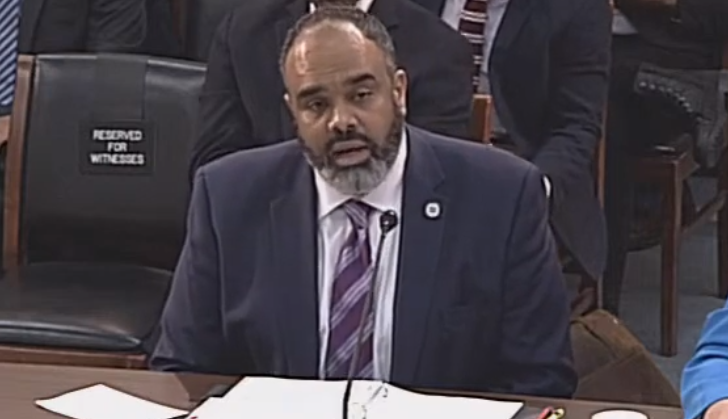Odom: TV Sidecars Could Derail Diverse Ownership

The smarter way to stay on top of broadcasting and cable industry. Sign up below
You are now subscribed
Your newsletter sign-up was successful
Former top FCC staffer Clint Odom told House members at a Hill hearing on media diversity this week that the way some broadcast station deals to sell TV stations to minority owners are structured could actually reduce diversity in the industry.
Odom was testifying at a House Energy & Commerce Communications Subcommittee hearing in his current role as SVP, advocacy and policy, and executive director of the Washington bureau of the National Urban League
He painted a depressing picture of diverse TV station ownership. "African Americans own 14 out of 1,374 (1.0%) full power commercial TV stations in the United States," he said, adding: "The owners of these television stations would fit in the 5 seats at this witness table."
Related: Pai Signals No Plans to Restore Diversity Reporting Forms
In is written testimony submitted to the committee beforehand, Odom had said that "the number of stations owned by people of color may be at risk of falling even lower than the incredibly low levels that exist right now," said Subcommittee chairman Mike Doyle (D-Pa.) to lead off the questioning of the witnesses. He asked Odom to explain what he meant.
Odom said he had been in contact with African American licensees who had raised the issue, which was that the ownership structure of some of those few African-owned media properties turned not on how long the license lasted but how long their financing lasted or their joint arrangements--"sidecar"--deals with TV ownership groups last.
He said that some of those 14 stations are at risk "not because of the license term ending but because of some of the financing arrangements.
The smarter way to stay on top of broadcasting and cable industry. Sign up below
Before joining the Urban League, Odom was an attorney and legal adviser to FCC chairman Bill Kennard and commissioner Jessica Rosenworcel and is currently a member of FCC's Advisory Committee on Diversity and Digital Empowerment.
During his testimony, Odom praised the National Association of Broadcasters Broadcast Leadership Training program and efforts to improve racial diversity and inclusion on "boards of directors, c-suites, staff, procurement, and community investment" by Comcast/NBC Universal, Charter, and T-Mobile in concert with the league.
"These companies have agreed to work with us not because diversity is a feel-good value. They have agreed to work with us because diversity is a business imperative," he said.
Odom also joined media companies in putting in a plug for reinstating the minority tax certificate program, which used to provide a tax break for companies that sold to minorities. Congress ended the practice in 1995, but a new bill, one of four being considered at the hearing, would restore it and extend the credit to women as well.
He also called on the FCC to resume collecting and publishing EEO data it has not collected in 20 years. "We can’t afford to keep these blinders on," he said.
Contributing editor John Eggerton has been an editor and/or writer on media regulation, legislation and policy for over four decades, including covering the FCC, FTC, Congress, the major media trade associations, and the federal courts. In addition to Multichannel News and Broadcasting + Cable, his work has appeared in Radio World, TV Technology, TV Fax, This Week in Consumer Electronics, Variety and the Encyclopedia Britannica.

